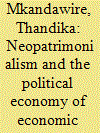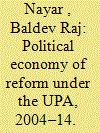|
|
|
Sort Order |
|
|
|
Items / Page
|
|
|
|
|
|
|
| Srl | Item |
| 1 |
ID:
139441


|
|
|
|
|
| Summary/Abstract |
This article argues that capitalist globalization is largely responsible for creating or intensifying many of our most serious economic and social problems. It first describes the forces that drove core country transnational corporations to create a complex system of cross-border production networks. It then maps the resulting new international division of labor, in which Asian countries, especially China, import primary commodities from Latin American and sub-Saharan African countries to produce exports for core countries, especially the United States. In core countries, globalization has led to the destruction of higher paying jobs, financialization of economic activity, and stagnation. While the new international division of labor has boosted third world rates of growth, especially in Asia, it has also left the third world with unbalanced and inequitable economies. Moreover, contradictions in the globalization process point to the spread of core country stagnation to the third world. Capitalist globalization has increased third world dependence on core country consumption while simultaneously undermining core country purchasing power. The article ends by discussing a process and program of transformation that highlights the feasibility of an alternative to global capitalism as well as the organizational capacities and institutional arrangements that must be developed if we are to realize it.
|
|
|
|
|
|
|
|
|
|
|
|
|
|
|
|
| 2 |
ID:
144613


|
|
|
|
|
| Summary/Abstract |
The mood of much of the world is grim these days. Turmoil in the Middle East, causing hundreds of thousands of deaths and millions of refugees [1]; random terrorist attacks across the globe; geopolitical tensions in eastern Europe and Asia; the end of the commodity supercycle; slowing growth in China [2]; and economic stagnation [3] in many countries—all have combined to feed a deep pessimism about the present and, worse, the future.
|
|
|
|
|
|
|
|
|
|
|
|
|
|
|
|
| 3 |
ID:
139924


|
|
|
|
|
| Summary/Abstract |
During the past two decades, neopatrimonialism has become the convenient, all purpose, and ubiquitous moniker for African governance. The school of thought behind this research program, which the author refers to as the neopatrimonialism school, has produced an impressive literature on Africa. Its analysis informs policymakers and its language permeates media reportage on African states. While neopatrimonialism has long been a focus of development studies, in recent times it has assumed politically and economically exigent status. The school identifies causal links between neopatrimonialism and economic performance, and makes predictions drawing from what is referred to as the "logic of neopatrimonialism." Neopatrimonialism is said to account for trade policies, hyperinflation, economic stagnation, low investment in infrastructure, urban bias, andultimately, the lack of economic development in Africa. This article examines the empirical basis of predictions and policy prescriptions. It argues that while descriptive of the social practices of the states and individuals that occupy different positions within African societies, the concept of neopatrimonialism has little analytical content and no predictive value with respect to economic policy and performance.
|
|
|
|
|
|
|
|
|
|
|
|
|
|
|
|
| 4 |
ID:
139090


|
|
|
|
|
| Summary/Abstract |
Electoral success during the reform process requires maintaining a prudent balance in meeting the requirements of the two basic state functions of accumulation and legitimacy. Initially, the Congress-led UPA government was the unintended beneficiary of the economic acceleration resulting from a global boom and the earlier economic reforms in aid of accumulation. The growth acceleration, however, also escalated rising expectations. In the effort to advance its legitimacy in order to assure continuance in power, the UPA government emphasized a distributive strategy to the neglect of accumulation. However, the rupture in growth acceleration because of external shock and internal economic mismanagement aggravated the loss of legitimacy stemming from a series of corruption scandals. The consequence was the emergence of an enormous “gap” between rising expectations and the existing reality of economic stagnation and high inflation. It is in the context of this gap that the Congress Party suffered its most severe electoral defeat in history.
|
|
|
|
|
|
|
|
|
|
|
|
|
|
|
|
| 5 |
ID:
086084


|
|
|
|
|
|
|
|